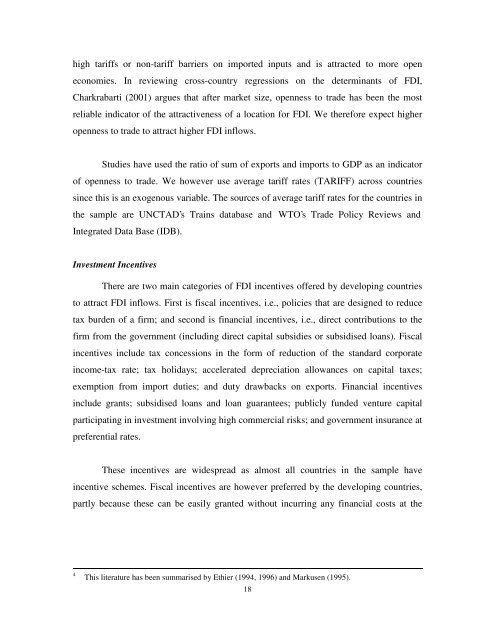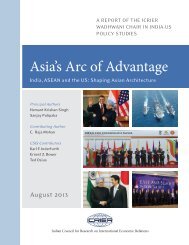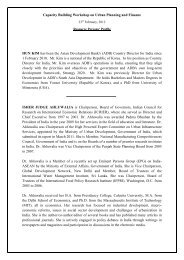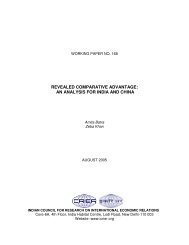impact of government policies and investment agreements on fdi ...
impact of government policies and investment agreements on fdi ...
impact of government policies and investment agreements on fdi ...
Create successful ePaper yourself
Turn your PDF publications into a flip-book with our unique Google optimized e-Paper software.
high tariffs or n<strong>on</strong>-tariff barriers <strong>on</strong> imported inputs <str<strong>on</strong>g>and</str<strong>on</strong>g> is attracted to more open<br />
ec<strong>on</strong>omies. In reviewing cross-country regressi<strong>on</strong>s <strong>on</strong> the determinants <str<strong>on</strong>g>of</str<strong>on</strong>g> FDI,<br />
Charkrabarti (2001) argues that after market size, openness to trade has been the most<br />
reliable indicator <str<strong>on</strong>g>of</str<strong>on</strong>g> the attractiveness <str<strong>on</strong>g>of</str<strong>on</strong>g> a locati<strong>on</strong> for FDI. We therefore expect higher<br />
openness to trade to attract higher FDI inflows.<br />
Studies have used the ratio <str<strong>on</strong>g>of</str<strong>on</strong>g> sum <str<strong>on</strong>g>of</str<strong>on</strong>g> exports <str<strong>on</strong>g>and</str<strong>on</strong>g> imports to GDP as an indicator<br />
<str<strong>on</strong>g>of</str<strong>on</strong>g> openness to trade. We however use average tariff rates (TARIFF) across countries<br />
since this is an exogenous variable. The sources <str<strong>on</strong>g>of</str<strong>on</strong>g> average tariff rates for the countries in<br />
the sample are UNCTAD’s Trains database <str<strong>on</strong>g>and</str<strong>on</strong>g> WTO’s Trade Policy Reviews <str<strong>on</strong>g>and</str<strong>on</strong>g><br />
Integrated Data Base (IDB).<br />
Investment Incentives<br />
There are two main categories <str<strong>on</strong>g>of</str<strong>on</strong>g> FDI incentives <str<strong>on</strong>g>of</str<strong>on</strong>g>fered by developing countries<br />
to attract FDI inflows. First is fiscal incentives, i.e., <str<strong>on</strong>g>policies</str<strong>on</strong>g> that are designed to reduce<br />
tax burden <str<strong>on</strong>g>of</str<strong>on</strong>g> a firm; <str<strong>on</strong>g>and</str<strong>on</strong>g> sec<strong>on</strong>d is financial incentives, i.e., direct c<strong>on</strong>tributi<strong>on</strong>s to the<br />
firm from the <str<strong>on</strong>g>government</str<strong>on</strong>g> (including direct capital subsidies or subsidised loans). Fiscal<br />
incentives include tax c<strong>on</strong>cessi<strong>on</strong>s in the form <str<strong>on</strong>g>of</str<strong>on</strong>g> reducti<strong>on</strong> <str<strong>on</strong>g>of</str<strong>on</strong>g> the st<str<strong>on</strong>g>and</str<strong>on</strong>g>ard corporate<br />
income-tax rate; tax holidays; accelerated depreciati<strong>on</strong> allowances <strong>on</strong> capital taxes;<br />
exempti<strong>on</strong> from import duties; <str<strong>on</strong>g>and</str<strong>on</strong>g> duty drawbacks <strong>on</strong> exports. Financial incentives<br />
include grants; subsidised loans <str<strong>on</strong>g>and</str<strong>on</strong>g> loan guarantees; publicly funded venture capital<br />
participating in <str<strong>on</strong>g>investment</str<strong>on</strong>g> involving high commercial risks; <str<strong>on</strong>g>and</str<strong>on</strong>g> <str<strong>on</strong>g>government</str<strong>on</strong>g> insurance at<br />
preferential rates.<br />
These incentives are widespread as almost all countries in the sample have<br />
incentive schemes. Fiscal incentives are however preferred by the developing countries,<br />
partly because these can be easily granted without incurring any financial costs at the<br />
4<br />
This literature has been summarised by Ethier (1994, 1996) <str<strong>on</strong>g>and</str<strong>on</strong>g> Markusen (1995).<br />
18
















